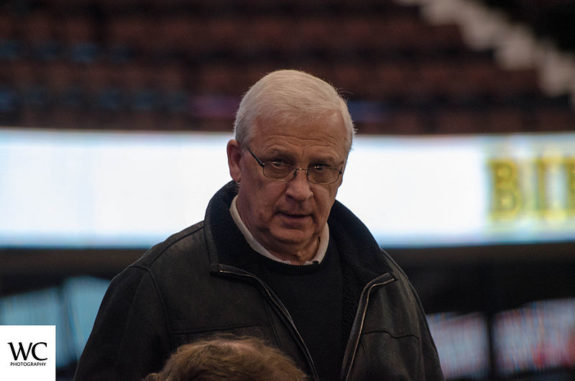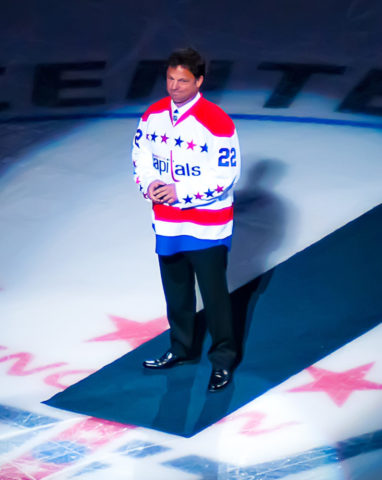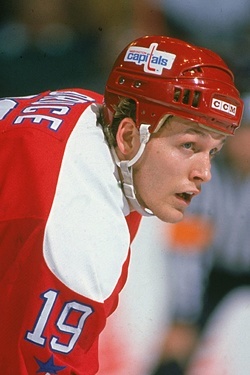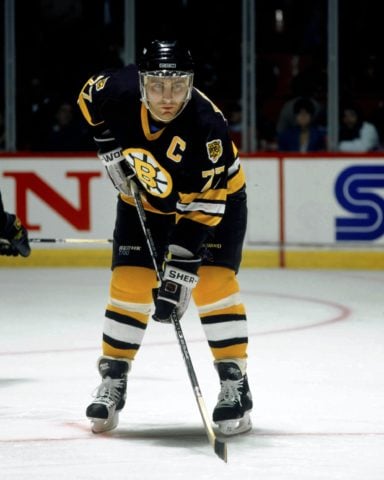During the decade of the 1980s, despite some strong regular-season teams where Washington passed the 100-point mark and featured several future Hall of Famers, the playoffs were mostly a struggle for the Washington Capitals. There was a barrier on the calendar they couldn’t break through — playing in the month of May.
Back then, the Stanley Cup Playoffs began in early April and wound up before Memorial Day, and so the month of May was usually reserved for the Conference Finalists, and Washington lost three Patrick Division Finals during the decade.
The Capitals fell to the New York Islanders in their first trip to the second round in 1984, then were upset by the New York Rangers in 1986 and again beaten by a lower-seeded opponent in the New Jersey Devils in 1988. That seven-game loss to New Jersey was the closest the Capitals came to May, but the game ended just hours short of the month on April 30.
Related: Capitals History: Hunter’s OT Goal Lifts Washington Past Flyers in 1988
As the calendar flipped to the 1990s, it seemed as if Washington’s chance for a deep playoff run with that star-filled core, featuring players such as Scott Stevens, Rod Langway and Dino Ciccarelli, was growing thin.
Change Behind the Bench
Just 15 days into the new decade, the Capitals made a dramatic change, replacing head coach Bryan Murray with his brother Terry. Bryan had coached the team since Nov. 1981, before Washington had ever qualified for the postseason, and made the playoffs in every full season since before his dismissal. Terry, a former Washington defenseman when Bryan took over the team, was promoted from coaching the American Hockey League’s (AHL) Baltimore Skipjacks to his first NHL job.

Thanks to injuries to Langway and Stevens in the first half of the 1989-90 season, the team that had won the regular-season Patrick Division title the previous season was in danger of missing the postseason with an 18-24-4 mark. Since 1983, Washington usually had little trouble getting through the regular season, finishing at least in third place in the Patrick every year from 1982-83 to 1988-89, securing at the time one of the division’s four playoff berths.
But things looked bleak for the Caps at that point, and Capitals general manager David Poile made the change to a new voice, parting with the longest-tenured coach in the NHL at the time.
“I’m as big a believer in Bryan Murray as anybody,” Poile told the media at the time (from ‘Capitals Fire Murray, Give Job to His Brother’, The Washington Post, Jan. 16, 1990). “We didn’t get rid of a bad person or a lousy coach. We made a change and went in a different direction.
“It’s a cliche to say we made a change for change’s sake. But things weren’t going well. We have the fourth-worst record in the NHL. We are 20(th) out of 21 on the power play. Not one of our players is near the top of the leaders in scoring. Our strength used to be our goals-against average. But we’re in the second half of the league in goals against. There is not one thing we can hang our hat on.”
Washington got healthier as the season progressed, and while the team still finished below .500 after 80 games, with a 36-38-6 mark, going 18-14-2 under Terry, they qualified for the playoffs as the third seed in the Patrick. They headed on the road as a lower-first-round seed for the first time since 1983.
Rematch With the Devils
The Capitals’ first-round matchup was with the second-place Devils, the team that had knocked out Washington in a physical seven-game, second-round series in 1988. New Jersey was just beginning to take form as the team that eventually won three Stanley Cups, and the expectations from Washington weren’t very high after a sub-par regular-season.

But Washington was able to start the series strong, thanks to Ciccarelli’s hat trick in Game 1 on April 5.
Ciccarelli opened up the series with two first-period goals, and after the Devils tied it back up, Dale Hunter and John Druce — who, coming into that year’s playoffs, had 16 total NHL goals in 93 career games — put the Capitals back in front. New Jersey again tied the score to force overtime, but Ciccarelli ended the game 5:34 into the extra session, collecting a rebound of a Kevin Hatcher shot and beating Sean Burke for a 1-0 series lead.
Despite the win, things seemed to revert back to the series expectations in Devils wins in Games 2 and 3, and the Capitals’ backs were against the wall in what could have been their final home game of the year in Game 4 on April 11, but that is when Druce started to heat up.
Stevens gave Washington the first goal of the game early in the second period with a shot through traffic, but the Devils pulled even on a 2-on-2 break with Kirk Muller beating Don Beaupre with 6:58 left in the frame, filling the the arena with doubt about if the Capitals’ season was nearing its end.
But just 15 seconds after the Muller goal, Druce cruised towards the net off a rush, deflecting a centering feed from John Tucker past Burke, and changed the complexion of the series. The goal proved to be the game-winner, and set the tone for the next two games.
Fittingly enough, Druce provided the series-winning goal in Game 6, jamming a Kevin Hatcher wraparound rebound past Burke to give Washington a 3-1 lead they would not relinquish, leading to the sellout crowd in Landover chanting “DRUUUUUUUCE!” as the Capitals eliminated the Devils in six games.
While Druce only had three goals that series, two of them ended up being game-winners, and arguably his Game 4 goal was one the biggest in shifting the momentum of the series away from New Jersey.
With a strong showing in Round 1, Druce’s second-round series against the Rangers was unlike any seen before in Capitals’ history, and grabbed the depth winger who spent the first two months of the year with the Skipjacks national headlines with an unexpected performance.
“Druce Is Loose” Against the Rangers
Against the regular-season Patrick Division champion Rangers, Washington started off the second round slowly, getting beaten 7-3 at Madison Square Garden on April 19. However, Druce stepped up and took over the series in Game 2.

After Mike Ridley staked the Capitals to a 1-0 lead in the first period, Druce took a rebound off a Stevens shot and beat John Vanbeisbrouck for his second goal of the young series, and fifth of the playoffs. In the second period, Druce struck again, tipping a Dale Hunter feed into the net for what became his third game-winning goal of the postseason, and then capped the night with his first career NHL hat trick into an empty net and a 6-3 final to even the series.
However, Washington suffered a setback late in the contest, losing Ciccarelli with a knee injury that sidelined the winger for the rest of the series, but Druce helped fill his goal-scoring void in a big way.
Back at the Capital Centre for Game 3, Druce again powered the Capitals’ offense in a 7-1 win, as he opened the scoring 6:04 into the contest and adding another goal less than five minutes later. Druce, who had eight goals in 45 regular-season games that year, already had nine playoff goals in Washington’s ninth playoff game, with six coming in the series.
In Game 4, Druce again added another pair of power-play goals to raise that goal total to 11 in 10 games, and Langway held off a Rangers comeback bid by scoring his biggest goal as a Capital in overtime for a 4-3 win and a 3-1 series lead.
Druce capped off his epic playoff series in overtime of Game 5, tipping a Geoff Courtnall pass past Vanbeisbrouck to send Washington to its first-ever Wales Conference Final on April 27 with a 2-1 win.
Druce’s series against the Rangers was one for the ages. He recorded nine goals in the series, placing him near the all-time NHL record, despite the series going just five games, and passing his entire regular-season total in that span. In addition, he had 12 goals in just 11 games overall in the first two rounds, earning him national attention, including a piece in Sports Illustrated.
“John Druce was not on the top of my list—anybody’s list—to come through the way he did,” Poile said in the piece (from ‘Druce on the Loose’, Sports Illustrated, May 7, 1990). “He came out of nowhere to be the hero.”
“They got something unexpected to happen, and that was John Druce,” then-color commentator Al Koken recalled of that playoff run to The Hockey Writers earlier this year. “He carried him on their backs. When one guy gets hot, the pressure’s off everyone else. If he’s carrying our team I can go out and just play hockey, not gripping my stick because I need to score goals.
“They got good goaltending that year, and it was one of those things, once and for all, something good is happening. The expected never seems to go through so the unexpected thing is going to take with John Druce and the way that entire team went up and got on that run.”
Koken also compared that 1990 run to Washington’s more recent run to the Stanley Cup four springs ago.
“We can see it now when we break down the key moments from 2018, down 2-0 in Columbus and if Lars [Eller] doesn’t score the ugly dirty goal, we’re not talking about a championship team.
“What we saw in 1990 was similar – it didn’t pay off in the ultimate, but very similar to once you got one break, everything else snowballed, and once John Druce got hot, everything snowballed and it was fun to watch.”
And, for the first time, the Capitals got a chance to play in May.
Injuries, Bruins Derail the Caps
Without Ciccarelli and Hatcher in the lineup, and with other Capitals playing with ailments, Washington’s playoff run came to an end quickly against the Boston Bruins in a four-game sweep. After Washington took a 3-2 lead into the second intermission in Game 1, Boston outscored Washington 10-1 in the next seven periods and closed out the Capitals in Game 4 at the Capital Centre.

Mike Fornes, who called those 1980s Capitals teams for Home Team Sports, said in an interview with The Hockey Writers recently he thought that 1990 should have been the Capitals’ time to win the Stanley Cup.
“They should have won the Stanley Cup,” he said. “In my mind, there’s no question. Head-to-head, we had done very well against Edmonton. The only problem is the Boston Bruins were in the way. They swept us. Two games in Boston, two games in Washington, and that was it. I think had they gotten past the Bruins, they would have done really well against Edmonton. And that might have been it.”
But, Fornes also thought the injuries were too much to overcome against a tough Boston team.
“They had so many injuries that year. The team had never played in the month of May, it was such a grind to be able to go that long, but the whole idea you were in a conference final. That was a great thing. It was somebody different.
“The Islanders had a spell on the Capitals for a while, the Rangers did it to us, the Devils did it to us, the Flyers loved doing it to us, but once you got past them, I think we were looking ahead a little bit too much. There were so many guys that were hurt, it just was too much.
“The team was out of gas, they just didn’t have anything left to give, there were so many injuries, and guys you wouldn’t think playing a big role on the team played a big role on the team.
“I mean, halfway through the regular season, who had ever heard of John Druce? And he comes in and he’s the star of the playoffs. He was ‘Druce on the Loose.’ He had the magic touch, and there was something about him that nobody had scouted that. They didn’t know that was coming at them.”
Fornes also said he wished Bryan Murray got the chance to be behind the bench that spring.
“It’s hindsight to look back and like I said, I don’t think with the injuries it would have made a difference, but in a perfect world, it really would have been something to have Bryan stay and the team actually beaten Boston, because I think we would have done well against Edmonton. I think maybe some of those injuries would have healed up, and we might have been OK. We might have had a Stanley Cup, I really think so.”
End of an Era in Washington
While that 1990 run was the longest run for that 1980s Capitals core, it was also the last one. Stevens left for the St. Louis Blues in free agency that summer, and Langway only played 141 more regular-season games for Washington before he was forced to retire due to injuries after the 1992-93 season.
Ciccarelli was traded to the Detroit Red Wings in June of 1992, and Druce was dealt to the Winnipeg Jets at the start of the 1992-93 campaign. But Druce and that team provided an April unlike others in Capitals history where an unknown player powered Washington to new heights.
Druce’s 14 goals in the postseason remained a Capitals playoff record until 2018, when Alex Ovechkin broke the record in Game 5 of the Stanley Cup Final — something which took the NHL’s third all-time goal-scorer nine more games to accomplish. His eight power-play goals in a playoff run remains a franchise record, and his four game-winning goals in a playoff year has only been matched by Joe Juneau in 1998, both capped by series-winning overtime goals.
For one April, the Capitals got an unlikely performance from an unlikely performer, and while Washington has gotten strong postseason performances in the 1998 and 2018 runs, it never has gotten another from as unlikely a hero as Druce.